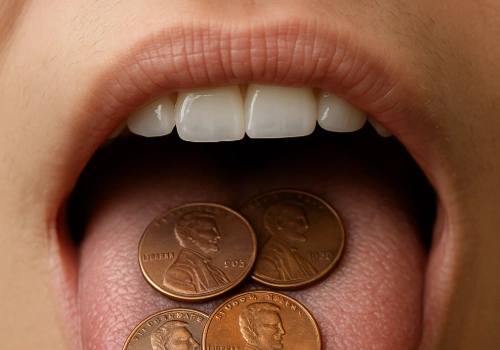
A metallic taste in your mouth — often described as tasting like “pennies,” “metal,” or “blood” — is more common than most people realize. While it may be unpleasant, it usually isn’t a sign of something serious. However, it can also indicate an infection, medication side effect, vitamin deficiency, or (rarely) an underlying medical condition.
This guide breaks down the most common causes, when to worry, and how a doctor can help.
What Causes a Metallic Taste in the Mouth?
A metallic taste (called dysgeusia) can occur for many reasons, ranging from everyday habits to underlying medical conditions.
1. Poor Oral Hygiene or Gum Disease
If you don’t brush or floss regularly, bacteria can build up around the teeth and gums, causing:
- Gingivitis
- Periodontitis
- Tooth infection
- Bad breath
These issues commonly produce a metallic or blood-like taste.
Tip:
If your gums bleed when brushing or flossing, it's time to see a dentist.
2. Cold, Sinus, or Respiratory Infections
Common infections that may alter taste include:
- Colds
- Sinus infections
- Upper respiratory infections
- COVID-19
When the sinuses are congested, taste and smell receptors can malfunction, creating a metallic taste.
This usually resolves once the infection improves.
3. Medications & Vitamins
Many medications list metallic taste as a side effect because the body processes the drug through saliva.
Common culprits include:
- Antibiotics
- Antidepressants
- Blood pressure medications
- Diabetes medications (like metformin)
- Gout medications
- Lithium
- Chemotherapy medications
Vitamins/minerals that may cause it:
- Multivitamins with zinc, copper, or chromium
- Iron supplements
- Calcium supplements
- Zinc lozenges
This taste typically fades once the supplement or medication leaves your system.
4. Acid Reflux or GERD
Stomach acid traveling upward into the throat can irritate tissues and produce a bitter or metallic taste, especially after eating.
Other symptoms may include:
- Burning in the chest
- Bloating
- Frequent throat-clearing
If untreated, GERD can worsen, so evaluation is recommended.
5. Pregnancy
Hormonal changes in early pregnancy—especially during the first trimester—can trigger:
- Metallic taste
- Food cravings/aversions
- Enhanced smell sensitivity
This is temporary and usually fades on its own.
6. Vitamin Deficiencies
Low levels of certain nutrients affect taste perception.
Common deficiencies:
- Vitamin B12
- Folic acid
- Zinc
If you have fatigue, numbness, or hair loss along with metallic taste, speak with your doctor about testing.
7. Neurologic or Medical Conditions (Less Common)
A persistent metallic taste may be linked to:
- Diabetes
- Liver disease
- Kidney disease
- Stroke
- Multiple sclerosis
- Dementia
Important: These conditions cause more symptoms than just taste changes. The metallic taste alone is usually benign.
8. Chemical or Heavy Metal Exposure (Rare)
Exposure to lead, mercury, or pesticides can cause metallic taste.
Call a doctor immediately if you believe you’ve been exposed.
How to Get Rid of a Metallic Taste
Your treatment depends on the cause, but these steps may help:
- Brush teeth and tongue twice daily
- Floss daily
- Stay hydrated
- Switch from metal utensils to glass, plastic, or wood
- Rinse with warm water + salt + baking soda
- Chew sugar-free gum or mints
- Treat underlying infections
- Discuss medication side effects with your provider
- Quit smoking
If symptoms last longer than 2–3 weeks, schedule a medical evaluation.
When to See a Doctor
You should seek medical care if the metallic taste:
- Lasts longer than 2–4 weeks
- Occurs with fever, difficulty swallowing, or mouth sores
- Happens along with fatigue, unexplained weight loss, or confusion
- Develops after starting a new medication
- Is accompanied by numbness, weakness, or neurological symptoms
A primary care doctor or ENT specialist can help pinpoint the underlying cause.
Care at BASS Medical Group
Our primary care physicians and ENT specialists can help determine why you’re experiencing a metallic taste and guide you toward the right treatment — whether the cause is dental, digestive, sinus-related, or metabolic.
To schedule an appointment, contact BASS Medical Group today.




